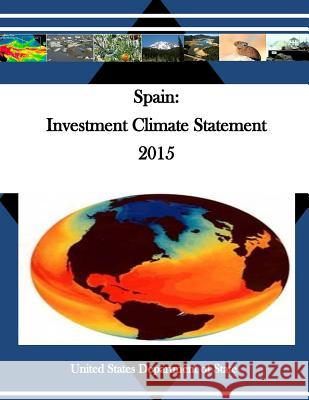Spain: Investment Climate Statement 2015 » książka
Spain: Investment Climate Statement 2015
ISBN-13: 9781530701490 / Angielski / Miękka / 2016 / 30 str.
Spain is open and seeking to attract additional foreign investment, particularly to help spur recovery from its recent economic crisis. Spain's well-educated work force, excellent infrastructure, large domestic market, and export possibilities have attracted foreign companies in large numbers over the past three decades. Spanish law permits foreign ownership in investments up to 100 percent, and capital movements are completely liberalized. In 2014, gross new foreign direct investment reached EUR 17.626 billion, with the six main investors in Spain being the United States, Luxembourg, the United Kingdom, France, Mexico, and the Netherlands. This investment focused particularly on activities related to real estate, finance and insurance, manufacturing and sales. Spain emerged from its recession in the third quarter of 2013. Even with a high unemployment rate - 23.7 percent as of the first quarter of 2015 - and significant household and public indebtedness, the economy continued to recover in 2014 and has benefited from a resurgence in domestic consumption. The government attributes this turn-around in part to the economic reforms it implemented beginning in 2012, the largest in the country's democratic history, which streamlined budgets and loosened labor laws to make hiring and firing easier. As part of this effort, the government sharply curbed public spending, which helped stabilize the fiscal situation. Major economic imbalances have been corrected, and competitiveness and flexibility are being restored. The government also implemented a series of labor market reforms and the restructuring of the banking system, all measures aimed at improving the efficiency in the allocation of resources, the full effects of which were visible by the end of 2014. To avoid the fragmentation of the domestic market emerging from differences of central, regional and local regulation, the 2013 Market Unity Guarantee Act was adopted. The law aims to rationalize the regulatory framework for economic activities, eliminating duplicative administrative controls by implementing a single license system that facilitates the free flow of goods and services throughout Spain. Spain has regained access to affordable financing from international financial markets, which has improved Spain's credibility and solvency, in turn generating more investor confidence. However, the Spanish government has yet to improve access to financing for small and medium-sized enterprises (SMEs), which still suffer from an important credit crunch. In implementing its fiscal consolidation program, the government has taken actions which negatively affect U.S. and other investors in the renewable energy sector on a retroactive basis. As a result, Spain is facing several international arbitration claims. Spain is a member of both the International Centre for Settlement of Investment Disputes (ICSID Convention) and the 1958 Recognition and Enforcement of Foreign Arbitral Awards (New York Convention). Spanish law protects property rights and those of intellectual property. The government has amended the Intellectual Property Act, the Civil Procedure Law, and the Penal Code to strengthen online protection. Still, internet piracy has continued to increase over the past several years. Spain and the United States have a Friendship, Navigation and Commerce (FCN) Treaty, and a Bilateral Taxation Treaty (1990), which was subsequently amended in 2013 and went into force in December of 2014.
Zawartość książki może nie spełniać oczekiwań – reklamacje nie obejmują treści, która mogła nie być redakcyjnie ani merytorycznie opracowana.











